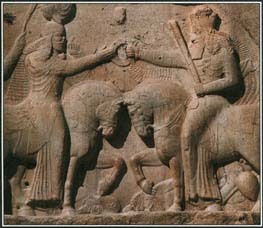Ahura Mazda
Ahura Mazda, whose name means "wise lord," was the most important god in ancient Persian mythology. When the religion known as Zoroastrianism became widespread in Persia around 600 B . C ., Ahura Mazda became its supreme deity. The Persians considered him to be the creator of earth, the heavens, and humankind, as well as the source of all goodness and happiness on earth. He was known to later Zoroastrians as Ohrmazd.
Ahura Mazda appears in Persian art and texts as a bearded man wearing a robe covered with stars. Dwelling high in heaven, he had the sun for an eye. In the Zoroastrian religion, Ahura Mazda was associated with light and fire, the emblems of truth, goodness, and wisdom. He created six divine beings, or angels, to help him spread goodness and govern the universe. One of the most important angels was Ahsa Vahishta ("Excellent Order" or "Truth"), the patron of fire and spirit of justice. Vohu Manah ("Good Mind") was a symbol of love and sacred wisdom who welcomed souls to paradise.
deity god or goddess
patron special guardian, protector, or supporter
The early Zoroastrians had a dualistic system of belief in which two opposing and equal forces—good and evil—battled for control of the world. Ahura Mazda (originally called Spenta Mainyu) represented light, truth, and goodness. His great

See also Ahriman ; Angels ; Persian Mythology .
Comment about this article, ask questions, or add new information about this topic: